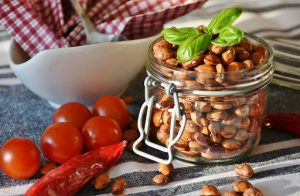Polycystic Ovary Syndrome or PCOS is a common fertility disorder in women. Many women around the world have it, and may even not know it. It affects reproductive-age women, generally 15 to 44 years. So is a plant-based diet good for PCOS?
A plant-based diet generally helps boost fertility in both men and women. And PCOS being the most common disorder in women, a lot of studies on fertility specifically focus on that. There’s quite some evidence that suggests this kind of healthy diet is good for women with PCOS.
PCOS is not just a concern for women who want to be mothers, it should be a concern for all women. It’s complications involve diabetes and heart disease as well. So it’s best to nip it in the bud and try to overcome the symptoms.
What is PCOS?
Polycystic Ovary Syndrome (PCOS) is a hormonal disorder where a woman’s body produces more male hormones than it needs to. This creates a hormonal imbalance which can impact ovaries and menstruation.

In PCOS, the ovaries develop fluid or follicles, which, in turn, reduce the production of eggs. Similarly, women with PCOS may have late or infrequent periods. Many small cysts form inside the ovaries, which contain immature eggs. They don’t release these eggs because of the lack or absence of the right hormones.
Also, the levels of estrogen drop and the levels of androgens (male hormones) increase.
What Are PCOS Symptoms?
PCOS signs may occur as early as puberty. However, it can also happen later in life. Some women may discover it as a result of infertility. Here are the main symptoms of PCOS:
- Irregular Periods: The hormonal imbalance in PCOS prevents the uterine lining from shedding, which means you may not have periods for long durations. Women with PCOS get lower than eight periods in a year.
- Heavy Menstrual Bleeding: When you do get your period, the bleeding may be heavier than normal.
- Hormonal Imbalance: The hormonal imbalance doesn’t just mess with menstruation, it also affects other systems and parts of the body. The increase in androgens causes hair growth on the body (hirsutism), acne, and male-pattern baldness.
- Enlarged Ovaries: Since ovaries develop follicles (cysts), they get enlarged. This prevents them from functioning normally.
What Are PCOS Causes?
Doctors don’t know what exactly causes PCOS in women, but there are several risk factors at play. Some are beyond your control, but others spring directly from poor lifestyle choices. Here’s what we know so far:
Hereditary
Is PCOS genetic? There’s some evidence that suggests there may be genes that cause this condition in women. So regardless of their general health and lifestyle, they may get it simply because of faulty genes.
Insulin Resistance
If your cells become insulin resistant, the body produces excess insulin as a response. This excessive insulin can also trigger the production of androgens, creating hormonal imbalance, and causing ovaries to stop ovulating properly.
Obesity and Poor Diet
Insulin resistance is a by-product of obesity and poor diet. A lot of women who get PCOS later in life usually are overweight. In fact, according to the American College of Obstetricians and Gynaecologists (ACOG), as many as 80 percent of women with PCOS are obese.
Similarly, a poor diet full of processed and sweet foods can lead to weight gain. That puts you at risk of developing fertility problems such as PCOS.
Inflammation
Researchers have also found a link between inflammation and PCOS. Women with PCOS show mild inflammation in their bodies, which may have influenced the ovaries to produce androgens excessively.
How is PCOS Diagnosed?
Your doctor will use your primary symptoms to start the diagnosis. You must have at least two of the main symptoms: irregular periods, ovarian cysts, and higher levels of androgens. They usually employ a physical pelvic exam, too, in the beginning.
The tests for PCOS involve blood tests that measure your hormone levels. You may also be given blood tests for cholesterol, triglycerides, and insulin, as these are raised by this condition. For ovaries and uterus, your doctor will use an ultrasound to look for follicles and cysts.
Does PCOS Affect Fertility?
Infertility in women can be caused by many reasons, but ovarian disorders remain particularly common. Infertility is not necessarily a part of PCOS, but rather a complication. PCOS can make it difficult for the woman to conceive. According to a Brazilian study, around 70 to 80 percent of women with PCOS face fertility problems.

Even if a woman with this condition does get pregnant, it can cause complications during pregnancy. With PCOS, you’re at a greater risk of gestational diabetes, miscarriage, hypertension, and premature delivery.
It’s important to note that women do get pregnant by treating their PCOS. There are many fertility treatments that enhance ovulation in such patients and help them conceive.
Is a Plant-based Diet Good for PCOS?
PCOS is something that affects a lot of women. Still, many don’t even know about it. Diet has always been associated with treating PCOS as it affects the insulin response of the body. There are all sorts of opinions on the internet, which can make it difficult for those with PCOS to really know what’s best for them.
The thing about a whole-food plant-based diet is that it’s not just talk, it’s backed by facts and research. If you look at the risk factors linked with PCOS, it doesn’t take one long to figure why a whole-food plant-based diet (emphasis on whole foods) is good for PCOS.
Weight Loss
The main indicator of a plant-based diet being beneficial for women with PCOS is weight loss. A plant-based diet is inherently nutrient-dense with low-calorie foods. It focuses on whole foods and whole grains, leaving out all animal products and processed foods. As a result, it can help women with PCOS lose weight.
A BMC Medicine study looked at the effects of PCOS on the lifestyle and mental health of women. It’s a great read as it explores the side of PCOS that doesn’t always get attention.
This review study also found that weight loss resulted in regular menstrual cycles and reduced symptoms. This weight loss was just under 10 percent.
Low Glycemic Index
The internet is abuzz with low-carb diets that benefit PCOS patients. Well, a low-carb diet can benefit by causing weight loss, but not all low-carb diets are equal. What you need is a low glycemic index diet, one which has those good carbs that don’t elevate blood sugar levels and keep insulin in check.
Source: https://pixabay.com/photos/red-pink-ruby-red-grapefruit-fruit-2367030/
The Glycemic index is the ability of the carb to increase glucose in your blood. Low glycemic index food doesn’t raise it too much, while high glycemic foods cause a sharp increase. A whole-food plant-based diet focuses on carbs through vegetables, fruits, and whole grains that typically have a low glycemic index.
A Human Reproduction Update Journal study involving many researchers confirmed that a low glycemic index diet was much better than traditional weight-loss diets. It found that menstrual periods became more regular for women with PCOS eating low GI foods.
High Fiber
The fiber-rich foods in a plant-based diet can help PCOS. Fiber helps regulate blood sugar and reduces insulin resistance, which is rampant in women with PCOS. By reducing insulin resistance, not only can they improve their PCOS symptoms, but also reduce the risk of type II diabetes.
Another great benefit of fiber is that it helps to flourish gut microbiome and improve digestion. This can also affect hormone production. Fiber binds with estrogen, so any excess estrogen that may be converting to testosterone will be removed via feces.
This hormonal balance is key for avoiding side effects of androgen excess in the body. Body hair and acne are common side effects of excess androgens in women. Not all women with PCOS may face these symptoms, so it will help prevent them from happening.
Antioxidants
The Antioxidants in plant-based foods help alleviate inflammation. As described earlier, low-grade inflammation is present in some women with PCOS. The antioxidants can treat the symptoms by reducing inflammation.
Furthermore, antioxidants are great for heart health. PCOS puts you at risk of heart diseases, so you need to be extra careful with what you eat. It’s incredibly important to consume more foods that are heart-healthy.
What Foods are Good for PCOS?
Food is directly linked with how PCOS is caused and treated. According to Dr. Michael Greger of NutritionFacts.org, AGEs or advanced glycation end-products are a major driver of PCOS, as they increase oxidative stress and inflammation. The AGEs mostly come from fried, roasted, and broiled animal-based foods. So cutting back on such foods can immensely help women with PCOS.

The key role in this scenario is played by the receptors for AGEs, which are concentrated in the ovaries. This helps explain why such foods may contribute to increasing the risk of PCOS or making it worse in those who already have it.
So which foods have the lowest AGEs? You guessed it, plant-based foods. Even cooked plant-based foods have very low AGEs compared with cooked animal-based foods.
We know that there’s no single plant-based diet, but many varieties and flavors. For those who have PCOS, here are some tips to ensure the plant-based diet works for you:
Eat Good Carbs
The idea of totally avoiding carbs for losing weight is not sustainable. Carbs are your main source of energy, so you do need some of it in your meals daily. Not all carbs are bad, some are low glycemic and don’t make you fat.
Avoid carbs like white bread and white rice, which are technically plant-based, but not so good for losing weight. Instead, go for carbs like whole wheat, sweet potatoes, brown rice, and quinoa.
Add Protein to Your Meals
Make sure you get enough protein in your meals. Those diets that promote protein for PCOS focus mainly on animal protein. You can get the same amount without any health hazards from plant-based proteins like soy, beans, and legumes.

Try to incorporate them into your meals, as this will also help you lose weight and give you ample energy to make up for the low carb intake.
Add Some Variety
You don’t want to be deficient in any nutrients while dealing with PCOS. Therefore, ensure that you’re consuming a wide range of foods. You need all your vitamins and minerals from your veggies and fruits.
Eat nuts and seeds as snacks between your meals. If juicing to lose weight, ensure you add some pulp for the fiber and use a variety of ingredients, including seeds.
Can PCOS Go Away?
PCOS doesn’t go away on its own and is essentially considered incurable. Some women feel the effects even after menopause. However, it’s very much possible to control it, especially if you want to have kids.

There are examples of women who have followed a plant-based diet rich in whole foods and have had successful pregnancies, delivering healthy babies. Most do it through weight loss, which is pretty effective.
Treatment through diet and lifestyle changes is much more sustainable and healthy than doing it with medications and hormone treatments. Not only can you get pregnant but also carry the pregnancy to term, avoiding all the possible complications caused by PCOS.
Can PCOS Kill You?
PCOS is not a life-threatening condition, but it can increase the risk of life-threatening conditions such as heart disease and endometrial cancer. Even if it doesn’t kill you, it can drastically change your life with complications such as metabolic syndrome, infertility, diabetes, and depression.
While PCOS doesn’t directly cause death, it’s still a serious condition that one should treat with lifestyle changes to avoid complications.
Wrap Up
Your diet plays a role in everything that you do and everything that happens to you. PCOS is no different. Is a plant-based diet good for PCOS? There are plenty of reasons to believe so.
If you’re trying to get pregnant and PCOS is making it difficult, a plant-based diet may be your best bet. Even if you don’t plan on having children, it can help you get your life back on track and reduce symptoms.
You may also like: TOP 3 PLANT-BASED MEAL DELIVERY SERVICES >>CLICK HERE!










